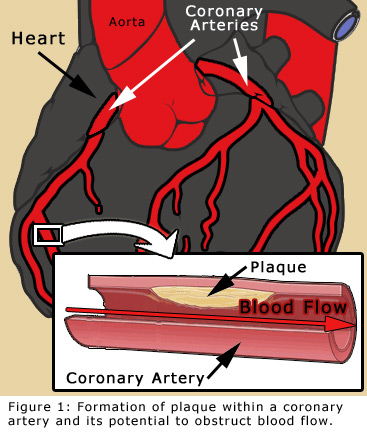 Coronary artery disease
Coronary artery disease, also
known as coronary atherosclerosis, results from a complex process that begins when cholesterol and other
inflammatory markers deposit themselves within the walls of blood vessels. Over time, the formation of
"cholesterol-blisters" or plaques within heart arteries presents two concerning problems: (1) the potential to
impair blood flow and oxygen delivery to the heart, and (2) the possibility of
sudden rupture leading to
a heart attack.
Almost all of us, if we live long enough, will develop "cholesterol-blisters" throughout the arteries in
our heart. If one or more of these "blisters" ruptures, clots form around the ruptured contents and a
heart attack often occurs as blood flow is obstructed by the formed clots. Although we have well-established
risk factors for having a heart attack (e.g. high blood pressure, high cholesterol, tobacco
use, diabetes, and family history), the precise moment that a "blister" will rupture remains very unpredictable.
The best way to reduce your risk of suffering a heart attack as a result of coronary artery disease is
to modify any known risk factors that may apply (e.g. optimize blood pressure control, reduce "bad" cholesterol
levels, stop smoking, diet, exercise). Medial therapy (e.g. aspirin, choletesterol medications, and others)
may be necessary to further reduce your risk. In the setting of a myocardial infarction, the presence of
unstable plaques, or symptomatic coronary artery disease,
coronary artery stenting may be of benefit.

 Coronary artery disease, also
known as coronary atherosclerosis, results from a complex process that begins when cholesterol and other
inflammatory markers deposit themselves within the walls of blood vessels. Over time, the formation of
"cholesterol-blisters" or plaques within heart arteries presents two concerning problems: (1) the potential to
impair blood flow and oxygen delivery to the heart, and (2) the possibility of sudden rupture leading to
a heart attack.
Coronary artery disease, also
known as coronary atherosclerosis, results from a complex process that begins when cholesterol and other
inflammatory markers deposit themselves within the walls of blood vessels. Over time, the formation of
"cholesterol-blisters" or plaques within heart arteries presents two concerning problems: (1) the potential to
impair blood flow and oxygen delivery to the heart, and (2) the possibility of sudden rupture leading to
a heart attack.